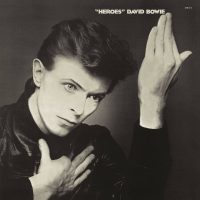 Recorded: July–August 1977
Recorded: July–August 1977
Producers: David Bowie, Tony Visconti
Engineers: Tony Visconti, Colin Thurston, Edu Meyer
Released: 14 October 1977
Personnel
David Bowie: vocals, keyboards, guitar, saxophone, koto
Carlos Alomar, Robert Fripp: guitarfra
George Murray: bass guitar
Dennis Davis: drums, percussion
Brian Eno: synthesizers, keyboards, guitar treatments
Antonia Maass, Tony Visconti, Peter Burgon: backing vocals
Contents
Tracklisting
- ‘Beauty And The Beast’
- ‘Joe The Lion’
- “Heroes”
- ‘Sons Of The Silent Age’
- ‘Blackout’
- ‘V-2 Schneider’
- ‘Sense Of Doubt’
- ‘Moss Garden’
- ‘Neuköln’
- ‘The Secret Life Of Arabia’
David Bowie’s 12th studio album, “Heroes” was the second part of the so-called ‘Berlin trilogy’ made with Tony Visconti and Brian Eno, and the only one of the three to be fully recorded in the German city.
“Heroes” began in Hansa Studios, West Berlin, by the Berlin Wall. The intense and diverse reaction to the experimental album Low proved that the best path for David, at this point in his career, was to continue to break all the rules. This continued to be the course of action with more or less the same team.
A New Career In A New Town (1977–1982) book
“Heroes” was recorded at Hansa Tonstudio 2, often known as Hansa by the Wall due to its proximity to the Berlin Wall. The music and lyrics on the album were informed by cultural and physical differences between East and West, the Russian Red Guards that could see into the studio, and the sheer scale of Berlin’s recent history all contributed to a darker, more claustrophobic atmosphere than that on Low.
We were the first big rock project recorded in Hansa. Before we took it over it was used almost exclusively for German pop music and classical music. One day Edu Meyer took us downstairs to a basement and showed us a closet full of valves (tubes, in the USA) manufactured during the war years. Each valve had a swastika stamped on them.Although the theme of the album was very upbeat and we were always in a good mood, the atmosphere was dense due to the visual proximity of the Wall from the control room. We could see the Red Guards in their turrets all day long and they were watching us through huge binoculars! We asked Edu if that ever bothered him and he responded by shining an overhead light towards them while sticking his tongue out. David and I dived under the console and yelled, ‘Stop doing that!’ For a second we thought they would open fire. On another night David, alone, parked his car on a desolate street close to the Wall, stopping for a smoke. Someone tapped his window and asked him for a light. He swore it was a Red Guard soldier with the unmistakable red star on his hat. In horror he gave the soldier a light. Apparently there were secret tunnels that went under the river and this guy was just out for a stroll on the west side.
There were many enjoyable things to do in West Berlin, pretty much the same as it is now only the East and West Berlins have once again merged. David, Iggy and Coco made lots of good friends. There were art galleries, great restaurants, great atmospheric bars and coffee houses and incredible themed night clubs you’d never see in any other city. One day we even drove through Checkpoint Charlie to have lunch in East Berlin. We had a great time there. all that great stuff got into the music and lyrics somehow and those experiences changed our lives. It was more than an album. It was an adventure.
A New Career In A New Town (1977–1982) book
Hansa’s Studio Two had been used as a dance hall by the Gestapo, and was known by Bowie as “The hall by the Wall”. “It was a Weimar ballroom,” he told Uncut in 2001, “utilised by Gestapo in the ’30s for their own little musical ‘soirées’.”
The studio itself was a relic. My first impressions were of the curtains surrounding the studio, and the darkness in the studio. It was not foreboding, just that the air was thick with a darker vibe. You have got to remember, we’re painting a picture based on our emotional disposition and you’re thinking: Germans, Nazis, the Wall, oppression. These things are hanging in the air, and when things get darker physically, you kind of think of darker themes too. Berlin was a rather dark, industrial place to work. There was one point when we wanted to see a bit of light and we asked them to open the curtains. There were these gigantic, heavy curtains and when they did that we saw the walk where the gunner is and that was a rather rude awakening. Although it gave us a cold slap in the face as to where we were, it also gave us a heavier resolve about the intensity of what we were doing.
Strange Fascination, David Buckley
Bowie lived in an apartment above a car spares shop at Hauptstraesse 155 in Berlin’s Schöneberg district, which his assistant Coco Schwab had found the previous year. For the first half of 1977 he shared the property with Iggy Pop, until the American singer moved into his own smaller apartment at the rear of the building.
When I settled there I found the claustrophobia of the Wall almost comforting. I agree that at times it was like living in a timeless zone. No English TV to speak of, except AFN, the American Forces Network.
Vogue, May 2003

Hi!
I just wanted to remark that the Dutch music programme presented by Ad Visser was called TopPop. It’s not super important, but might help people find any excerpts easier.
Thank you! Corrected now.